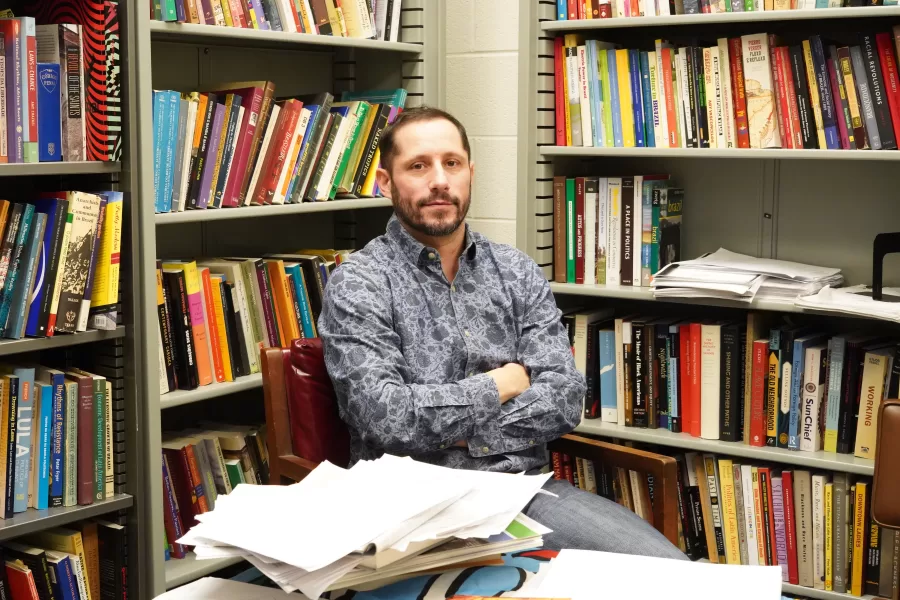Coup changes Brazil history class structure
Marc Hertzman, associate professor in LAS, sits among a collection of books in his office in Gregory Hall.
February 15, 2023
After the attempted coup of the Brazilian government last month, Marc Hertzman, associate history professor, decided that he had to change how he taught his class — HIST 405: History of Brazil — for the upcoming semester.
“I just kind of thought, ‘Wow,’” Hertzman said. “It was a gradual realization, ‘I can’t teach this class the way I normally do.’”
The attempted coup on Jan. 8 was a culmination of many social and political factors, including how Jair Bolsonaro, former right-wing president, undermined election results for months after his loss in October.
Bolsonaro’s supporters stormed government offices to protest the transition of power to President Luiz Inácio Lula da Silva, also referred to as Lula.
But the issue is a lot more complicated, as students in the class are coming to understand.
Get The Daily Illini in your inbox!
For Brazilian students in the class, it’s been an opportunity to talk about issues important to them, which they can’t do in Brazil.
“To me, it’s like a breath of fresh air,” said Danielle Massulo Bordignon, graduate student studying Portuguese-Brazilian studies. “To be here and have the chance to talk, to not feel repressed — it’s amazing.”
In the first three weeks of the semester, the class — made up of undergraduate and graduate students — explored coverage of the coup attempt. Lectures and activities were driven by student questions.
These questions included the connection to Brazil’s 20-year military regime, Bolsonaro’s ties to white supremacy and how the Portuguese-language press is different from the Spanish-language press.
“I’d say a good number of the students, you know, had some sense of (recent events in Brazil),” Hertzman said. “But that’s really what we’ve done collectively, sort of like build our own understanding of it.”
Part of that understanding has come from comparing Brazil’s Jan. 8 to the United States’ Jan. 6 insurrection, he said.
“This is possibly an opportunity for (students) to be thinking about regime change, about democracy, about the functioning of government and transfer of power in a way that is, on the one hand unique, and on the other hand, very much has to bear with our world today,” Hertzman said.
But Hertzman and some of the Brazilian graduate students in the class said there’s limits to that comparison.
For example Daiane Geremias Goulart, graduate student studying Latin American & Brazilian studies, said that comparing the countries takes away from what “must be paid attention to.”
“This has already happened in Brazil, and I think only comparing it to the U.S. loses the important things that must be paid attention to,” she said.
Each of the graduate students in the class had the opportunity to present a more nuanced topic related to recent events in Brazil.
Leonardo E Silva Ventura, graduate student studying Latin American & Brazilian studies, explained to undergraduates how white supremacy played a role in the coup attempt and Bolsonaro’s presidential term.
“The democracy is threatened at this moment, and you need to understand the history behind it,” Ventura said.
He sees a connection between the social progress that’s been achieved in recent decades for marginalized groups in Brazil and why Bolsonaro supporters want to return to the old days of military intervention.
Undergraduate students said this class is unlike anything they’ve taken before — answering the question of why history matters because it starts with such a visible, recent event.
“It’s exciting, especially since I don’t have much background information on Brazil,” said Summer Matthes, junior in LAS. “I go in everyday like everyone else, reconstructing the country’s history and putting it into context.”
Matthes said the most interesting thing she’s learned is how far back Brazil’s history can explain present day issues. To understand the motivations of Bolsonaro supporters, for example, the class needed to dive into Brazil’s history of military dictatorship.
Brazilians view the military differently than Americans, Bordignon said.
Having worked in Brazil’s federal courts, she explained how two decades of military rule is a reason why the country’s current constitution lists more legal rights for citizens compared to the U.S. Constitution.
“We have lost our democracy before,” Bordignon said.
Even though this isn’t the first time Hertzman has tried to connect the present to the past in his teaching, he said it’s different this time because of how engaged students are.
“The students and the conversation we’re having are demonstrating to me how dynamic it can be when students take charge of the material,” he said.
Hertzman said that he hopes this experience will encourage students to “broaden their horizons” and think about other places in the world — and not just in the context of history.
“There’s a lot to learn about our own sort of precarious state right now by looking somewhere else,” he said.







